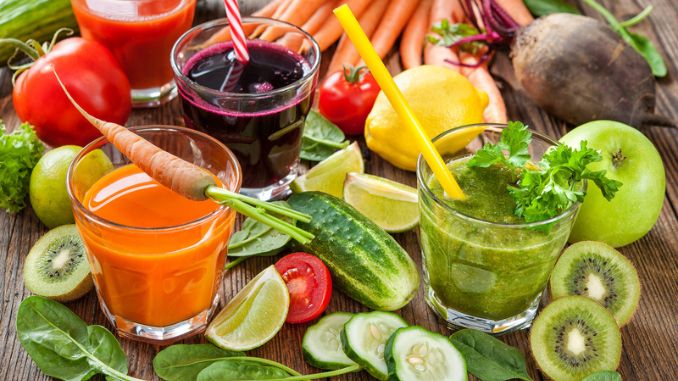You’re likely here following your doctor’s recommendation to boost your nitric oxide levels. To help with that, consider incorporating these four drinks into your diet: beetroot juice, pomegranate juice, watermelon juice, and green tea. Moreover, these drinks can directly boost nitric oxide levels in your body.
I guess you commonly have heard about this, but you don’t really know where this comes from or how to even boost its level.
Nitric oxide isn’t something you hear about as often as fiber, protein, vitamins, or minerals, especially when it comes to diet.
But it’s just as important!
In this article, we’re going to dive into what nitric oxide is all about and why boosting its levels is crucial, particularly for our cardiovascular health. Plus, we’ll reveal four drinks that will directly boost your nitric oxide levels.
What Is Nitric Oxide?
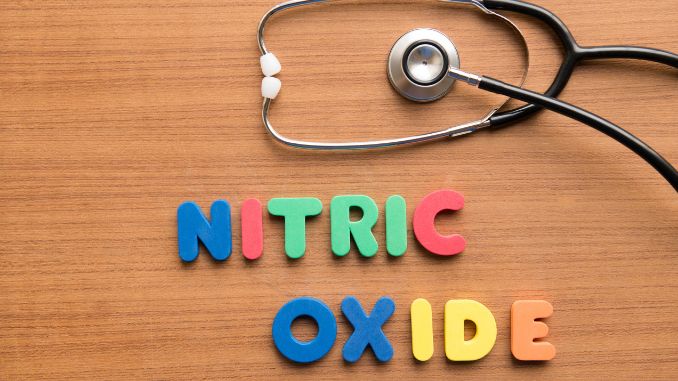
You might not hear about nitric oxide as much as fiber or protein, but it’s a vital molecule your body produces naturally. Then, think of it as a messenger that helps your cells communicate with each other.
One key function of nitric oxide is helping blood vessels relax. Moreover, this relaxation, known as vasodilation, improves blood flow and lowers blood pressure, keeping the heart and circulatory system in good shape.
Nitric oxide also plays a role in your immune response, nerve communication, and muscle function. It’s like a multi-tasker that supports various aspects of your health.
Nitric oxide is particularly important if you’re dealing with certain health conditions.
- Cardiovascular Issues: If you have high blood pressure, heart failure, or peripheral artery disease, a doctor might suggest ways to improve nitric oxide production to boost blood flow and reduce strain on the heart.
- Erectile Dysfunction (ED): Since nitric oxide is crucial for blood flow to the penis, a doctor might recommend ways to increase nitric oxide for managing ED.
- Age-Related Decline: Nitric oxide levels tend to decrease with age. If you’re experiencing age-related issues like decreased cognitive function or exercise limitations, a doctor might recommend ways to boost your body’s natural production.
As we get older or face certain lifestyle challenges, our nitric oxide levels can drop. Therefore, that’s why learning how to boost these levels is so important for maintaining your long-term health.
Nitric Oxide Boosting Drinks
1. Beetroot Juice
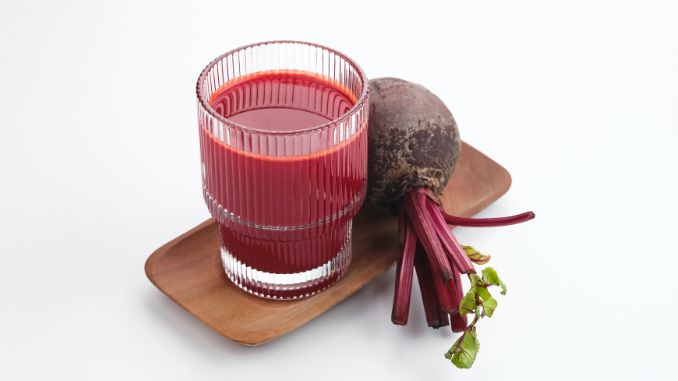
When identifying vegetables that strongly increase nitric oxide production, beetroot stands out as the most evidently effective. And then, beetroot has been the subject of extensive research due to its high nitrate content, which the body converts into nitric oxide.
This process helps improve blood flow, reduce blood pressure, and enhance exercise performance. Moreover, numerous studies have highlighted beetroot’s health benefits, making it a top choice for naturally boosting nitric oxide levels.
Hence, beetroot juice is often recommended as a concentrated source of these beneficial nitrates. Drinking beetroot juice can significantly increase your nitric oxide levels [¹], improving blood flow and cardiovascular health.
It’s a convenient and effective way to harness the power of beetroot’s nitrates, making it a popul Nitric oxide can be effectively obtained from natural food sources choice for those looking to boost their nitric oxide levels naturally.
How to make a delicious Beetroot juice:
Ingredients:
- 2 medium-sized beetroots, peeled and chopped
- 1 apple, cored and chopped (optional for added sweetness)
- 1-inch piece of ginger peeled (optional, for flavor)
- 1 lemon, juiced
- 1 cup water
Instructions:
- Peel and chop the beetroots into small pieces to make blending easier.
- In a blender, add the chopped beetroots, apple (if using), ginger (if using), and lemon juice.
- Pour in the water.
- Blend the ingredients until smooth. You may need to pause occasionally to stir the mixture, ensuring it is thoroughly blended.
- If you like smoother juice, pour the mixture through a cheesecloth or fine mesh strainer into a bowl or pitcher. Use a spoon to press out as much liquid as possible.
- Pour the juice into a glass and enjoy immediately for the best nutritional benefits.
- If you have leftovers, store the juice in an airtight container in the refrigerator for up to 2 days. Shake well before drinking.
2. Green Tea

Green tea is another excellent drink that can help boost your nitric oxide levels. Then, rich in antioxidants, particularly catechins, green tea helps boost nitric oxide levels, promoting better blood flow and cardiovascular health.
Moreover, research concluded that green tea can help reverse the negative effects of diabetes on eNOS (an enzyme important for blood vessel health) in kidney cells and diabetic rats. Therefore, green tea seems to improve the function of eNOS by increasing levels of BH4, a molecule that helps eNOS work properly, and reducing the oxidation of BH4.
By boosting BH4 levels, green tea reduces the dysfunction of eNOS, which leads to less oxidative stress and more nitric oxide availability [²]. This means that green tea can potentially help improve blood vessel health in diabetic conditions.
Drinking green tea regularly can contribute to improved vascular function, lower blood pressure, and overall heart health. Therefore, it’s a simple and enjoyable way to support your body’s nitric oxide production naturally.
3. Green Leafy Vegetable Juice
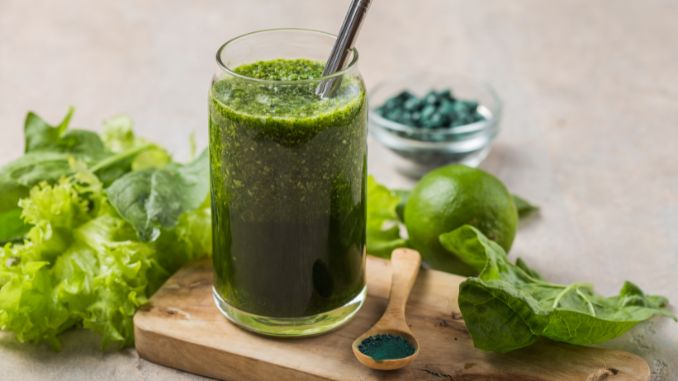
Another excellent vegetable juice for promoting nitric oxide production is green leafy vegetable juice. Therefore, vegetables like kale, arugula, and spinach are high in nitrates, which, like beetroot, convert to nitric oxide in the body. Moreover, this improves blood flow, lower blood pressure, and enhances overall cardiovascular health.
Nitric oxide can be effectively obtained from natural food sources [³] like green leafy vegetables rather than supplements. Opting for these natural sources helps avoid potential side effects associated with supplements.
How to make a refreshing Green Leafy juice:
Ingredients:
- 2 cups spinach or kale leaves (or a mix of both)
- 1 cucumber, chopped
- 1 green apple, cored and chopped (optional for added sweetness)
- 1 lemon, juiced
- 1-inch piece of ginger peeled (optional, for flavor)
- 1 cup water or coconut water (for a tropical twist)
Instructions:
- Wash the spinach or kale leaves thoroughly to remove any dirt.
- Chop the cucumber and apple into small pieces to make blending easier.
- Peel and chop the ginger if using.
- In a blender, add the spinach or kale leaves, chopped cucumber, apple (if using), ginger (if using), and lemon juice.
- Pour in the water or coconut water.
- Blend the ingredients until smooth. You might need to stop and stir the mixture a few times to ensure everything is well-blended.
- If you prefer a smoother juice, pour the mixture through a fine mesh strainer or cheesecloth into a bowl or pitcher. Use a spoon to press out as much liquid as possible.
- Pour the juice into a glass and enjoy immediately for the best nutritional and health benefits.
- If you have leftovers, store the juice in an airtight container in the refrigerator for up to 2 days. Shake well before drinking.
4. Pomegranate Juice
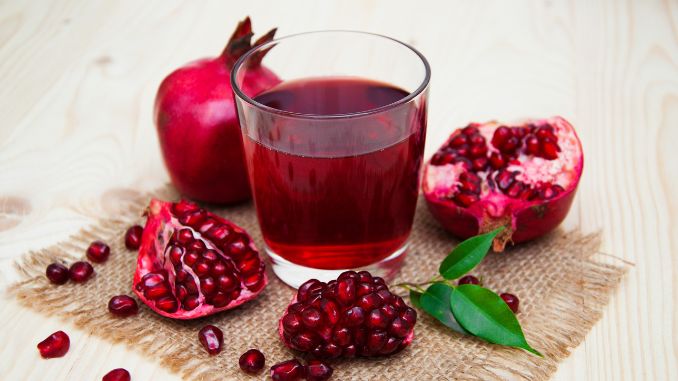
Pomegranate juice is another excellent choice for naturally increasing nitric oxide levels. In research, it was observed that pomegranate juice has strong antioxidant properties that significantly protect nitric oxide (NO) against oxidative destruction [⁴], thereby leading to increased nitric oxide production.
Therefore, regular consumption of pomegranate juice can help reduce blood pressure, improve blood flow, and lower the chance of heart disease.
How to Make Fresh Pomegranate Juice:
Ingredients:
- 2 large pomegranates
- 1 cup water (optional, to dilute if desired)
Instructions:
- Cut the pomegranates in half and remove the seeds (arils).
- Place the pomegranate seeds in a blender and blend until smooth.
- If you prefer a smoother juice, strain the blended mixture through a fine mesh strainer or cheesecloth into a bowl or pitcher. Use a spoon to press out as much liquid as possible.
- If the juice is too concentrated for your taste, add water to dilute.
- Pour the juice into a glass and enjoy immediately.
- Any leftovers can be stored in an airtight container in the refrigerator for up to 3 days. Shake well before drinking.
Disclaimer: The juices recommended in this article are intended to support overall health and wellness. They should not be used as a substitute for professional medical advice, diagnosis, or treatment. If you have any allergies, existing health conditions, or concerns, please consult with your doctor or healthcare provider before incorporating these juices into your diet. Individual results may vary, and it is important to consider your dietary restrictions and personal health needs when making any changes to your nutrition.
Conclusion
Boosting your nitric oxide levels can have profound benefits for your cardiovascular health, overall well-being, and even sexual function. Therefore, incorporating a few powerful drinks into your daily routine can naturally enhance your nitric oxide levels and support various aspects of your health. Moreover, four drinks that will directly boost nitric oxide are beetroot juice, green tea, green leafy vegetable juice, and pomegranate juice.
Start with beetroot juice, known for its high nitrate content, which improves blood flow, reduces blood pressure, and enhances exercise performance. This is one of the four drinks that will directly boost nitric oxide.
Green tea is another excellent choice, rich in antioxidants like catechins, known to enhance nitric oxide production, which not only boosts nitric oxide levels but also improves vascular function and supports heart health. Remember, green tea is one of the four drinks that will directly boost nitric oxide.
Don’t forget about green leafy vegetable juice made from spinach, kale, or arugula. These vegetables are rich in nitrates, which the body converts into nitric oxide, promoting better blood flow and cardiovascular health. Then, this is another one of the four drinks that will directly boost nitric oxide.
Moreover, pomegranate juice, with its potent antioxidant activity, protects and increases nitric oxide production, helping to reduce blood pressure and lower the risk of heart disease. Therefore, incorporating pomegranate juice, one of the four drinks that will directly boost nitric oxide, can significantly support your cardiovascular health.
After that, by incorporating these four delicious and nutritious drinks into your daily routine, you can exceptionally enhance your nitric oxide levels, improving blood flow, reducing blood pressure, and supporting overall vascular and sexual functions.
Take the first step towards a healthier heart with our 14-Day Heart Health Quick Start Program! In just two weeks, you’ll discover simple and effective ways to boost your nitric oxide levels, improve your cardiovascular health, and feel more energized. Don’t wait—start your journey to a stronger heart and a better you today! Sign up now and make your heart health a priority.

References
1.Dos Santos Baião D, Vieira Teixeira da Silva D, Margaret Flosi Paschoalin V. A Narrative Review on Dietary Strategies to Provide Nitric Oxide as a Non-Drug Cardiovascular Disease Therapy: Beetroot Formulations—A Smart Nutritional Intervention. Foods. 2021; 10(4):859. https://doi.org/10.3390/foods10040859
2. Faria, A. M., Papadimitriou, A., Silva, K. C., Lopes de Faria, J. M., & Lopes de Faria, J. B. (2012). Uncoupling endothelial nitric oxide synthase is ameliorated by green tea in experimental diabetes by re-establishing tetrahydrobiopterin levels. Diabetes, 61(7), 1838–1847. https://doi.org/10.2337/db11-1241
3. Kiani, A. K., Bonetti, G., Medori, M. C., Caruso, P., Manganotti, P., Fioretti, F., Nodari, S., Connelly, S. T., & Bertelli, M. (2022). Dietary supplements for improving nitric-oxide synthesis. Journal of preventive medicine and hygiene, 63(2 Suppl 3), E239–E245. https://doi.org/10.15167/2421-4248/jpmh2022.63.2S3.2766
4. Ignarro, L. J., Byrns, R. E., Sumi, D., de Nigris, F., & Napoli, C. (2006). Pomegranate juice protects nitric oxide against oxidative destruction and enhances the biological actions of nitric oxide. Nitric oxide : biology and chemistry, 15(2), 93–102. https://doi.org/10.1016/j.niox.2006.03.001

Rick Kaselj MS, is a leading kinesiologist and injury specialist as well as co-creator of the best-selling Unlock Your Hip Flexors program. Rick creates exercise programs that help people heal injuries and eliminate pain, so they can go back to living a full, active, healthy life.

